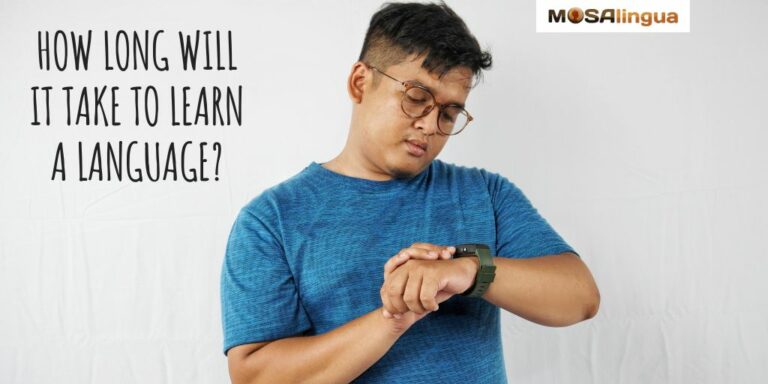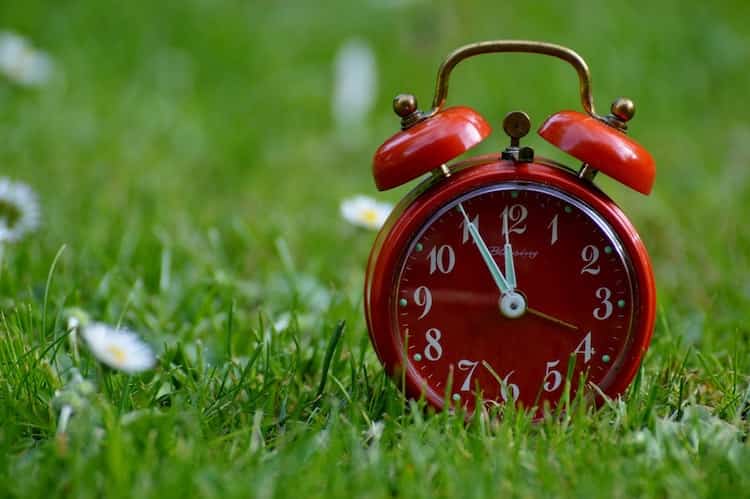If you’re thinking about learning a language, or have already started, chances are that you have asked yourself: “How long does it take to learn a language?” (That, and “How do I learn a language?“) Good news! Today I’m going to answer this question and hopefully clear up your doubts.

How Long Does It Take to Learn a Language?
Based on our formula, it takes 420 hours IF you can study 3 hours per week, you study a language not too far from your native language, and you are very motivated. That’s about 7 months of fairly intensive study. If you want to know how we got to that number, keep reading!
The $1-Million Question
“How many hours will it take me to learn a language?”
This is a hot topic in language learning, especially considering how fast-paced today’s society is. We naturally like to know how long things are going to take, and what the end result will be.
This is the same desire that led to the creation of 2-minute microwave mac and cheese (because why wait 10 minutes for real pasta to boil??).
It’s why many people would prefer to watch 20-minute TV adaptations of novels instead of reading them.
Let’s face it: humans are impatient. Taking on a new language can seem daunting, especially when you aren’t quite sure how much work it will be and how long the process will take.
We hope that by breaking down this complex question, more people will be willing to take the plunge and start learning a new language.
Because after all, mom’s homemade mac and cheese tastes way better than the microwave kind, the book is nearly always better than the movie, and communicating in a foreign language is a true pleasure that can drastically improve your life!
How long does it take to learn a new language? Luca’s thoughts
First, let’s see what the co-founder of MosaLingua, Luca, has to say about the subject!
In case you didn’t know, Luca has already learned 6 languages (English, French, Spanish, Portuguese, Romanian and German) so he has a lot of experience in estimating how long it takes to learn a language.
Watch his video (turn on the subtitles in English or in your native language if you need to) here. Or, read the recap below:
Be sure to subscribe to our channel for more videos like this one.
How Much Time Does it Take to Learn a Language: Important Questions to Ask Yourself
Luca accurately explains that there are several factors that can drastically change the amount of time needed to learn a language. In particular: your language goals, your native language and the language you have chosen to learn, how much time you can dedicate to language study, and how motivated you are. Ask yourself these four things, and you’ll be able to calculate a rough estimate to the million-dollar question: how long does it take to learn a language?
-
What level do I want to reach?
When you say you want to learn Spanish, do you mean that want to be able to order your beer during your holidays (true beginner level)? Or is your goal to give a talk in Spanish about a complex topic like immigration or tax policy?
Your goals make a huge difference, because becoming an advanced speaker of the language could take you several years, while grasping the basics of a language can be done in just a few months.
The level which I particularly like and recommend to most people could be defined as “conversational.” When a person has “conversational Spanish skills” they have reached a level that allows them to talk about familiar topics and get by in a variety of situations. If the language is not too far from your native language, you can even achieve this conversational level in three months.
-
How far from my native language is the target language?
To answer this, you’ll need to ask yourself another question: What language do you want to learn?
This is very important, because if you’re an Italian or French speaker who wants to learn Spanish, then your task is going to be easier and take less time and effort than if you’re a German speaker who wants to learn Chinese or Japanese. If the language you want is close (similar vocabulary or roots, similar grammar structures, similar sounds) to your native language or another language that you already master, you should be able to pick it up quite quickly.
Again, I think that a French or Italian speaker could achieve a passable level of Spanish in three months, provided that they use the right methods and tools.
On the contrary, if the same person wants to learn Chinese or Korean, then they should be prepared to study pretty intensely for at least one year to achieve the same level.
Many learners sometimes forget about this distinction.
-
How much “free” time do I have to study?
Another important aspect to consider is the amount of weekly or daily time you can dedicate to learning a language.
Let’s take a personal example: I reached a B2 level in French after five months of intensive study (starting from scratch). I used to spend at least three hours per day studying French. More often than not, I studied up to five hours, every single day. People are often amazed by the result I got. That was several years ago. Looking back, I sometimes find it hard to believe that I was willing to spend so much time learning French.
Today, I am an entrepreneur, I have a family, and I have other hobbies and responsibilities! In other words, I don’t have three hours a day to spend on language study anymore. And not many people do. So again, knowing yourself and your schedule can make a huge difference.
It goes without saying that the more you study, the faster you’ll learn. Three months of intensive study can make you learn a lot and take you from a true beginner to an intermediate level.
Let me add that in any case, the key is consistency. You’ll be amazed at how much you can learn by studying every day, even if you only spend 10 minutes practicing.
-
How strong are my motivations?
The fourth and final factor I want to talk about is related to the previous one. Why do you want to learn a particular language? Do you need to use it for work? Are you planning to move to another country? Or is it just for fun?
Every reason can be good, but not all reasons are equal. Some are more powerful than others, but this is quite a personal question. Why? Because if you have strong motivations to learn a language, you’ll study it more regularly and maybe more intensively, and this will result in getting results faster.
And here is where the magic comes in: once you start seeing results, your motivation will continue to grow, and you will find yourself studying more. This activates a kind of virtuous cycle and you are sure to learn the language faster.
Crunching Numbers: How Many Hours Does It Take to Learn a Language?
Plenty of people (some experts, some not) think they know how long it takes to learn a language. And let me tell you, their estimates vary wildly!
How long does it take to learn a language? – Opinions from around the field
FSI
People often cite the Foreign Service Institute’s School of Language Studies scale. They estimate that it takes between 600 and 2200 “classroom hours,” depending on how similar the target language is to English. They have broken down the most common languages into four categories. Category I is the most similar to English and Category IV (“super-hard languages”) is the least.
Category I is also called “World Languages,” and includes languages such as French, Italian, Spanish, and Portuguese, but also some Nordic languages like Danish and Swedish.
German falls under Category II, along with Indonesian and Swahili, to name a few. The FSI estimates that these languages take roughly 36 weeks of intensive study to learn.
The third category, Category III, which they call “Hard Languages,” contains the most languages (like Greek, Russian, Vietnamese, and Polish). They say you can expect to spend about 44 weeks of intensive study if you want to achieve proficiency in one of these languages.
And finally, Category IV includes Chinese, Japanese, Korean, and Arabic. The FSI estimates that you’ll need about 88 weeks to learn them.
Cambridge
Another popular and well-respected source for these estimations is the Cambridge Assessment English exam board. They base their estimates on the Common European Framework of Reference (A1-C2, which correspond to different levels of language proficiency).
They estimate that it would take a beginner between 180 and 200 hours of “guided learning” to move up to the next level (A2). According to this model, to achieve the highest level of fluency, a C2, a beginner would need to put in between 1,000 and 1,200 hours of work.
These are fine metrics, but I think it depends on a lot more than the target language’s proximity to English. If it didn’t, everyone who has taken a language through high school would be fluent…
MosaLingua Does the Math
Although I definitely consider myself a “language person,” I’ve always enjoyed math, too. So, based on Luca’s four questions and the MosaLingua recommendation of 20 minutes of study per day, I’ve come up with a sort of formula you can use to estimate the amount of time you’ll need to learn the language of your choice. Even if math isn’t your thing, it’s a very basic equation!
60 hours * X = Approximate number of hours to learn a language
Bear with me, and I’ll show you how I got there. Essentially, we will be multiplying 60 hours times a factor that will vary depending on the answers to your questions.
Why 60 hours?
Firstly, I’ll explain the 60 hours.
At MosaLingua, you may have heard us say that you only need 10-20 minutes of practice per day if you want to make language progress. If you learn ten new flashcards a day (10 minutes), you will have learned over 1800 words and expressions (plus 10 minutes of review to make sure you don’t forget them) after just 6 months! (If you’re interested, here’s how I got there: 20 minutes per day * 7 days a week * 26 weeks = roughly 60 hours.) That is PLENTY of vocabulary to express the basics! We’ll use this as a starting point.
Find X
Now, let’s factor in our answers to Luca’s questions. I’ve created a scale for each question. Add up your answer to each question to find X.
1. What level do I want to reach?
1– beginner, 2– beginner-intermediate, 3– conversational, 4– intermediate, 5– intermediate-advanced, 6– advanced
2. How similar are my native language and my target language?
1– very similar, 2– somewhat similar, 3– somewhat dissimilar, 4– very dissimilar
For this, it can be helpful to refer to the FSI chart we mentioned. A Category I language in their model would refer to a 1 in ours, and so on and so forth.
4. (We’ll get to #3 in a minute) How motivated am I?
1– extremely motivated, 2– very motivated, 3– motivated, 4– somewhat motivated, 5– I am being forced against my own will to learn a language (not recommended 😉 )
Then, add these numbers up and multiply the total by 60 hours.
Back to question #3. Once you know how many hours you’ll need, you can divide them up however you like. This will depend on how quickly you need or want to learn. We just recommend that you split them up evenly.
Rather than, say, a marathon 15-hour study session once a month and nothing in between, shoot for 30 minutes a day for a month. You’ll spend the same amount of time studying, but you’ll actually retain what you learned. Most importantly, you won’t get burnt out.
Our equation assumes you are a true beginner. Of course, these aren’t the only factors that can influence the amount of time you need to learn a language. Your method and tools are very important for optimizing your time.
Is it really that simple?
Depending on your circumstances, you might also want to factor in other elements.
For example: your previous experience with independent language learning, other languages you already know, if the language you chose is one of the most difficult languages to learn – or not (based on things like word length and logical or illogical grammar rules), your ability to concentrate for long stretches (if you want to study for 3 hours a day like Luca did, you’ll need a lot of stamina), the likelihood that your schedule will not vary causing you to have less time than expected, and even things like nutrition and brain health.
I’ll let you do the math on your own. It would be impossible to account for all of the possible variables!
The formula in action
Let’s go back to Luca’s personal experience that he talked about in his video. He said that he reached a B2 level in French from scratch in 5 months, studying intensely (usually 3 hours a day). Does our formula work? Let’s give it a try.
First, let’s find x. Luca wanted to reach a B2 level, which translates to about a 4 on our scale.
French is quite close to his native language, Italian, so we’ll give that a 1.
Finally, his motivation. If he was willing to devote 3 hours a day to language study, I’d say he was pretty motivated. How about a 2 for that parameter?
So: 4 + 1 + 2 = 7.
60 hours x 7 = 420 hours
Those 420 hours were split up over 5 months, or roughly 150 days. That gets us a total of 2.8 hours per day. Pretty close!
After those initial hours, you’ll need to spend a few minutes a day on upkeep. And of course, continue to set new language learning goals!
How long does it take to learn a new language in your case? You tell us! Test out our formula. Then, let us know in the comments section how long it will take you to pick up a new language and when you’re planning to begin! Happy learning!
Listen
If you’d prefer a hands-free experience, you can also listen to this article on our podcast, the MosaLingua Language Lab:
Listen to “#67 – How Long Does it Take to Learn a Language?” on Spreaker.
Related posts:
Want to start improving your language skills today?
Start learning a new language today

Good news: we can help!
More good news: you can get started for free! Start your free trial now and for the next 15 days, take advantage of the most effective language learning method on the market!
Vocabulary flashcards, videos with subtitles, audiobooks, articles adapted to your level – with MosaLingua Premium (Web & Mobile), you’ll have access to all this and more. Get started right now. It’s free—and risk-free—to try!





Comments